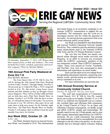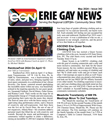Biden Administration Hosts First Bisexual Health Equity Roundtable; Bi+ Community Leaders Share Stories, Stats
[Washington, D.C., September 20, 2022]: For Bisexual Awareness Week, fifteen bisexual and pansexual community leaders will meet with federal agency officials at the Department of Health and Human Services to discuss remedies to the shocking health disparities facing the bisexual community--a community that comprises more than half of the LGBT population.
Six years after the last of three Bisexual Community Roundtables under the Obama Administration, the Biden White House invites community leaders back to talk to agency officials about specific policy benchmarks. Bisexual and pansexual people face specific disparities in mental and physical health, intimate partner violence, and Monkeypox prevention, treatment, and care. In order to begin remedying these disparities and more, advocates will present the administration with a set of Benchmarks, including the creation of a Federal Interagency Bisexual Liaison and a Federal Interagency Bisexual Working Group.
The fifteen advocates comprise a wide cross-section of the bisexual community, including nonbinary, transgender, female, young, older, Black, Asian, and Muslim advocates, people with disabilities, and parents. They come from many walks of life: academia, education, research, health care, advocacy, law, media, and community activism.
Khafre Abif is a Black bisexual educator, father, and person living with HIV. "This meeting has been a long time coming for the bi+ community," said Abif. "I'm looking forward to a dialogue with federal officials about solving some of the health issues we face."
Robyn Ochs is a pillar of bisexual and pansexual community organizing. "Research has made clear our health disparities and invisibility. It's time for federal interventions to catch up with what we already know through research and lived experience."
Frustrated by years of inaction by the federal government to release bisexual-specific data, target the bisexual and pansexual community with tailored interventions, and recognize the importance of bi+ health in general, community advocates are cautiously excited by this opportunity to share critical data and remedies.
To get involved, please visit https://www.biplusorganizingus.org/.





